Unsheathed Excellence: The Top 10 Samurai Movies to Awaken Your Inner Warrior
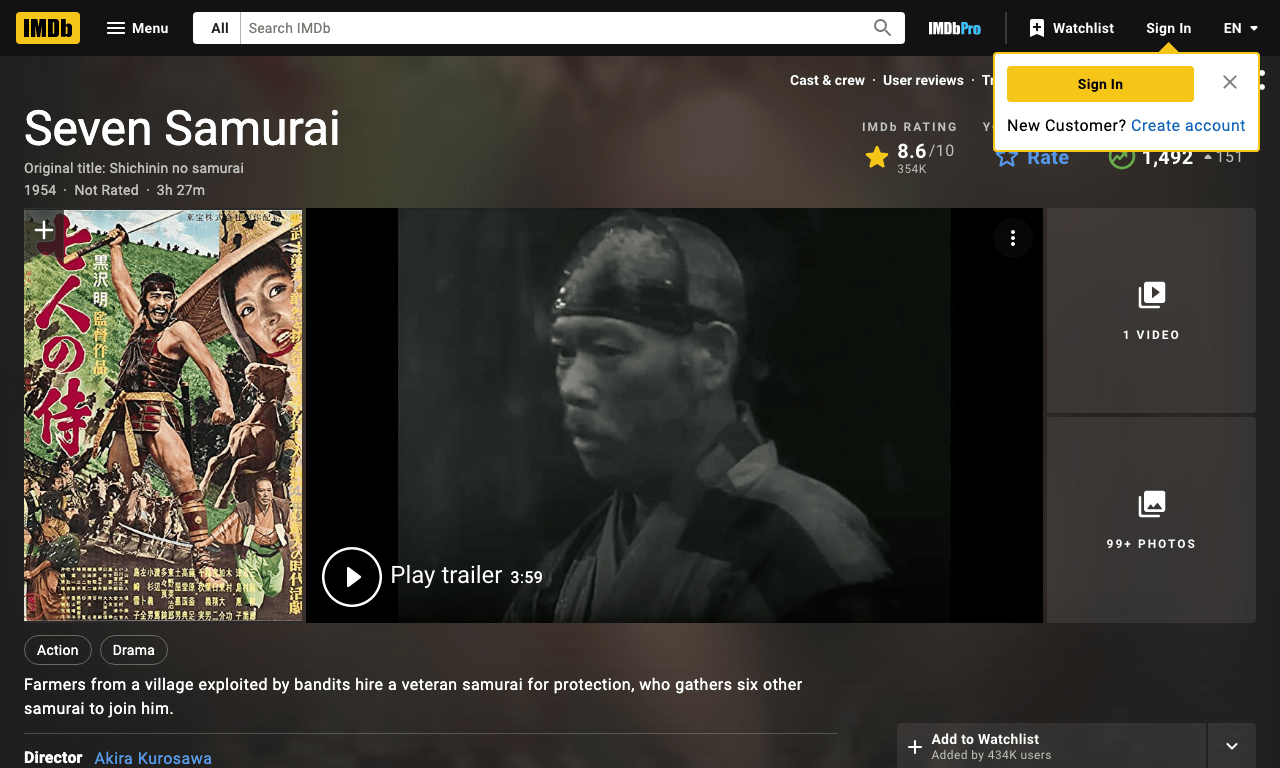
1. Seven Samurai
8.6
Seven Samurai is a 1954 Japanese epic samurai film directed by Akira Kurosawa. The story takes place in 16th century Japan, where a small farming village is under constant threat by bandits. In order to defend themselves, the villagers hire a group of seven samurai to protect them. The film explores themes of honor, sacrifice, and the nature of heroism.
Pros
- The film features masterful direction by Akira Kurosawa, with stunning cinematography and action sequences that still hold up today.
- The ensemble cast delivers exceptional performances, bringing depth and complexity to their characters.
Cons
- The film’s runtime exceeds three hours, which may be a deterrent for some viewers.
- The pacing may feel slow to those accustomed to fast-paced modern films.
Conclusion: Seven Samurai is a timeless masterpiece that has influenced countless films and filmmakers. It is a must-watch for any cinephile and showcases the brilliance of Akira Kurosawa’s filmmaking.
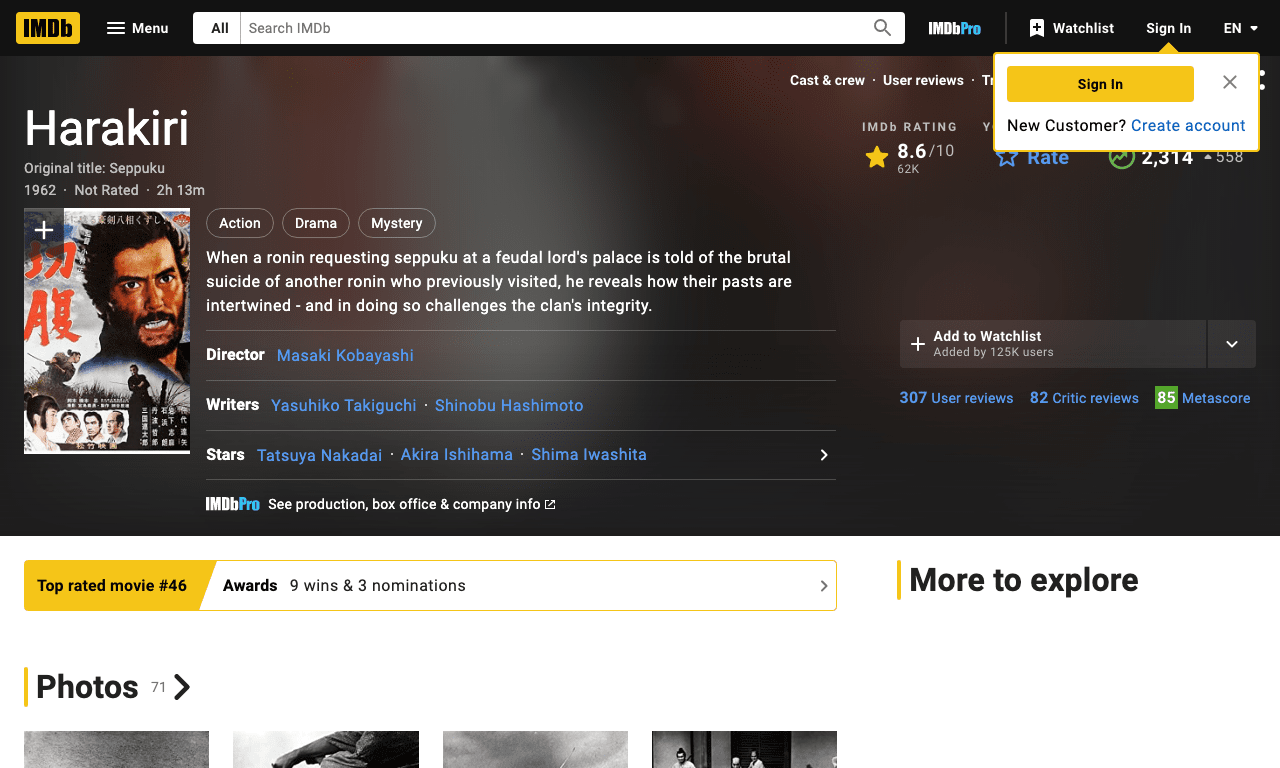
2. Harakiri
8.5
Harakiri, also known as Seppuku, is a 1962 samurai film directed by Masaki Kobayashi. The film tells the story of Tsugumo Hanshiro, a ronin (masterless samurai) who seeks permission to perform harakiri (ritual suicide) in the courtyard of a powerful feudal lord. As Hanshiro recounts his tragic tale and challenges the codes of honor and loyalty, the film explores themes of honor, duty, and the destructive nature of the samurai code.
Pros
- The film features a compelling and thought-provoking story that delves into the complexities of honor, duty, and sacrifice.
- The performances in Harakiri are exceptional, particularly Tatsuya Nakadai in the leading role. His portrayal of Tsugumo Hanshiro is powerful and captivating.
Cons
- Harakiri is a slow-paced film that may not appeal to those who prefer more action-driven samurai movies.
- The film’s themes and narrative can be complex, requiring close attention and patience from the viewer.
Conclusion: Harakiri is a masterfully crafted samurai film that offers a thought-provoking exploration of honor, duty, and the human spirit. With exceptional performances and a captivating story, it is a must-watch for fans of Japanese cinema and anyone interested in profound character-driven narratives.
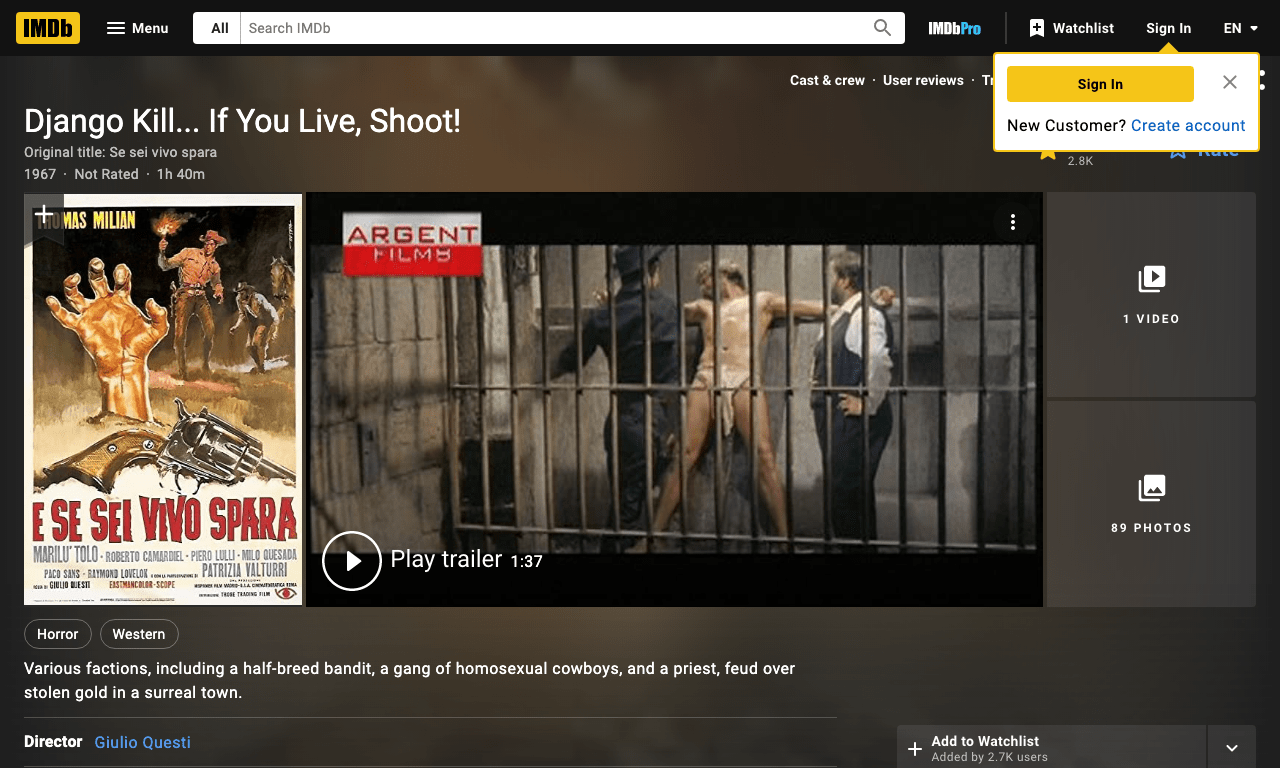
3. Samurai Rebellion
7.7/10
Samurai Rebellion is a 1967 Japanese film directed by Masaki Kobayashi. It tells the story of Sasahara Isaburo, a samurai who is forced to choose between loyalty to his lord and the love for his family. The film explores themes of honor, duty, and the oppressive nature of feudal society. With its excellent performances, compelling story, and stunning visuals, Samurai Rebellion is considered a classic of Japanese cinema.
Pros
- Powerful performances: The film features standout performances from the cast, particularly Toshiro Mifune as Sasahara Isaburo. His portrayal of a samurai torn between his loyalty and family is captivating and adds depth to the film.
- Compelling story: Samurai Rebellion tells a gripping story of love, loyalty, and sacrifice. It explores the moral complexities of feudal Japan and delves into the inner conflicts faced by the characters, making it a thought-provoking watch.
Cons
- Slow pacing: Some viewers may find the pacing of the film to be slow, as it takes its time to develop the characters and build tension. However, this deliberate pacing serves to enhance the emotional impact of the story.
- Violence and brutality: Samurai Rebellion depicts scenes of violence and brutality, which may not be suitable for all audiences. The realistic portrayal of samurai conflicts can be intense and may be unsettling for some viewers.
Conclusion: Samurai Rebellion is a powerful and thought-provoking film that explores themes of honor, loyalty, and sacrifice. With its stellar performances and compelling story, it is a must-watch for fans of Japanese cinema and historical dramas. Despite its slower pacing and intense violence, the film offers a profound examination of feudal society and the struggles faced by its characters.
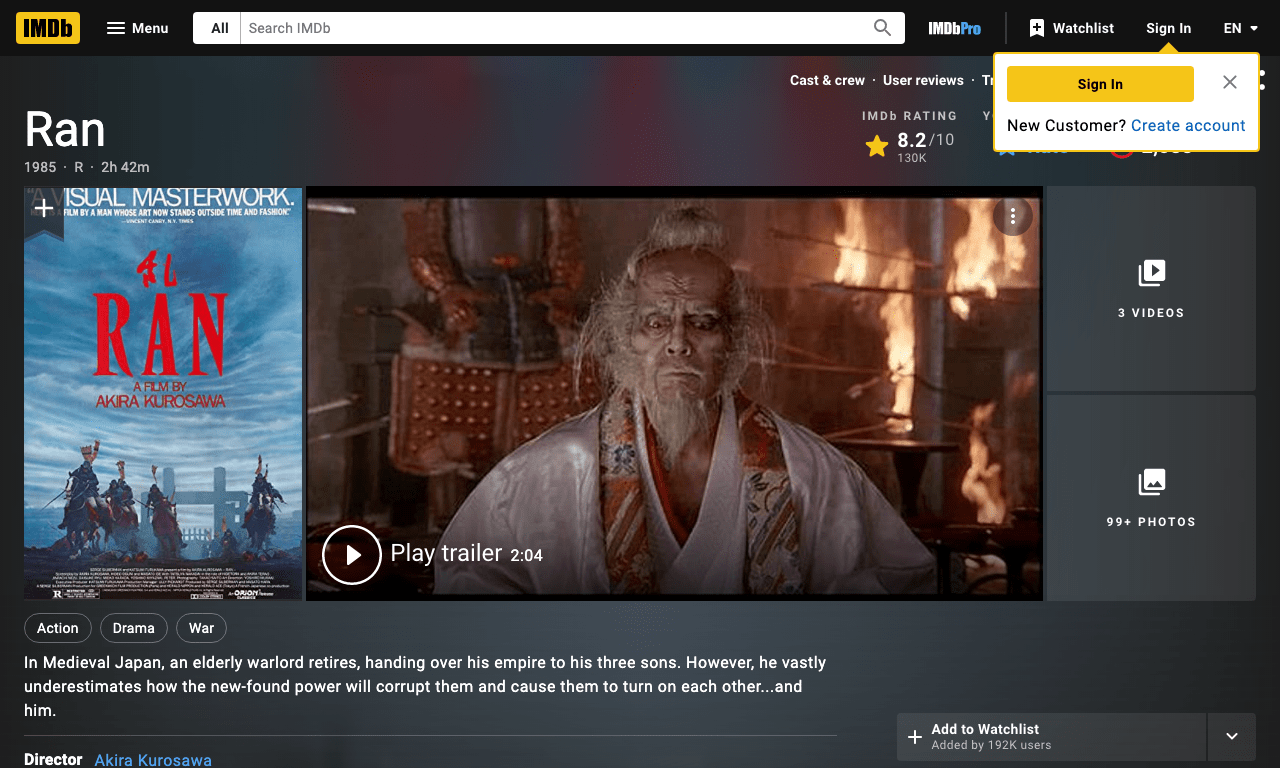
5. Ran
8.2/10
Ran is a historical drama film directed and co-written by Akira Kurosawa. The movie was released in 1985 and is considered one of Kurosawa’s greatest works. It tells the story of an aging warlord who decides to divide his kingdom among his three sons, leading to a brutal power struggle.
Pros
- Epic and visually stunning cinematography
- Powerful performances by the cast
Cons
- The pacing of the movie might feel slow for some viewers
- The complex plot might be confusing for those unfamiliar with Japanese history
Conclusion: Ran is a masterpiece of filmmaking that showcases Akira Kurosawa’s mastery of storytelling and visuals. While it may not be a movie for everyone, it is a must-watch for fans of historical dramas and Kurosawa’s work.
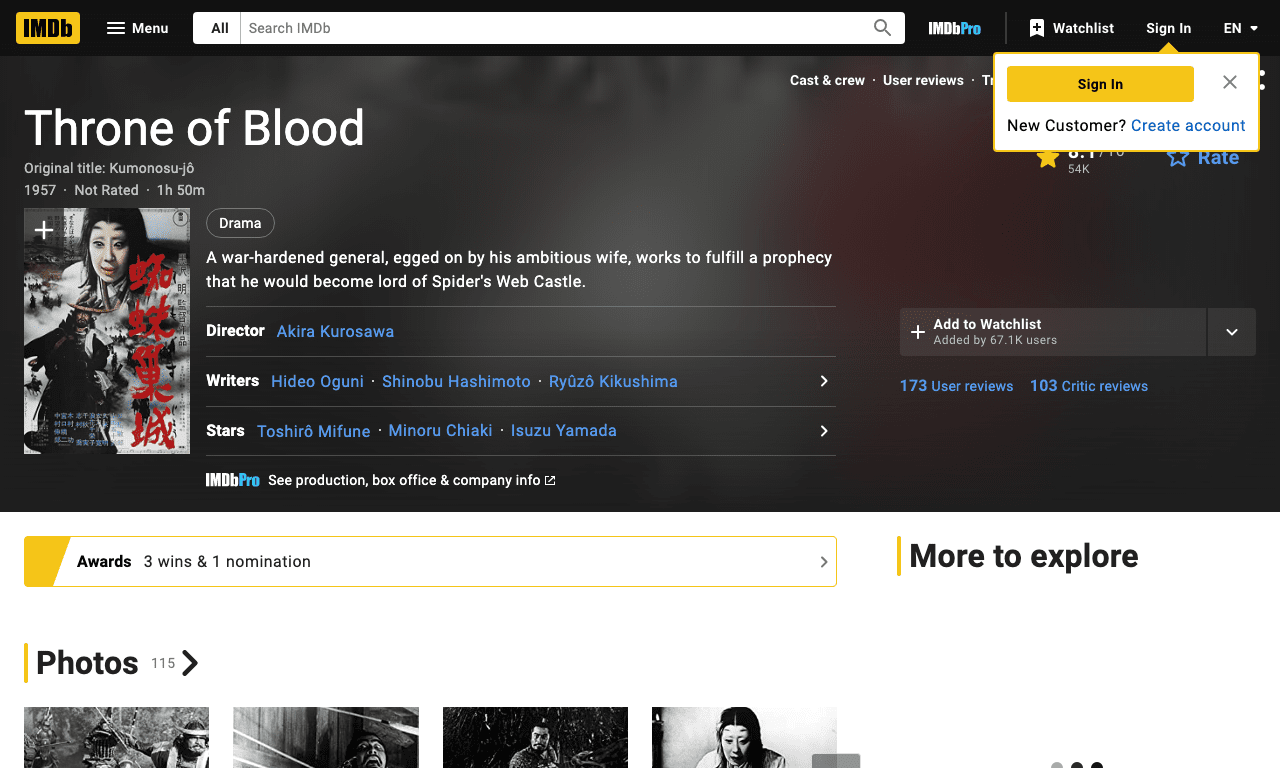
6. Throne of Blood
8.1
Throne of Blood is a Japanese samurai film directed by Akira Kurosawa. Released in 1957, the movie is considered one of the greatest film adaptations of William Shakespeare’s play Macbeth. It follows the story of a warrior who becomes consumed by ambition and betrayal, leading to his tragic downfall.
Pros
- Visually stunning cinematography
- Powerful performances by the cast
Cons
- May be hard to follow for those unfamiliar with Shakespeare’s Macbeth
- The pacing might be slow for some viewers
Conclusion: Throne of Blood is a masterpiece by Akira Kurosawa that successfully translates the themes of Shakespeare’s Macbeth into the samurai world. With breathtaking visuals and compelling performances, it is a must-watch for fans of both Shakespeare and Kurosawa.
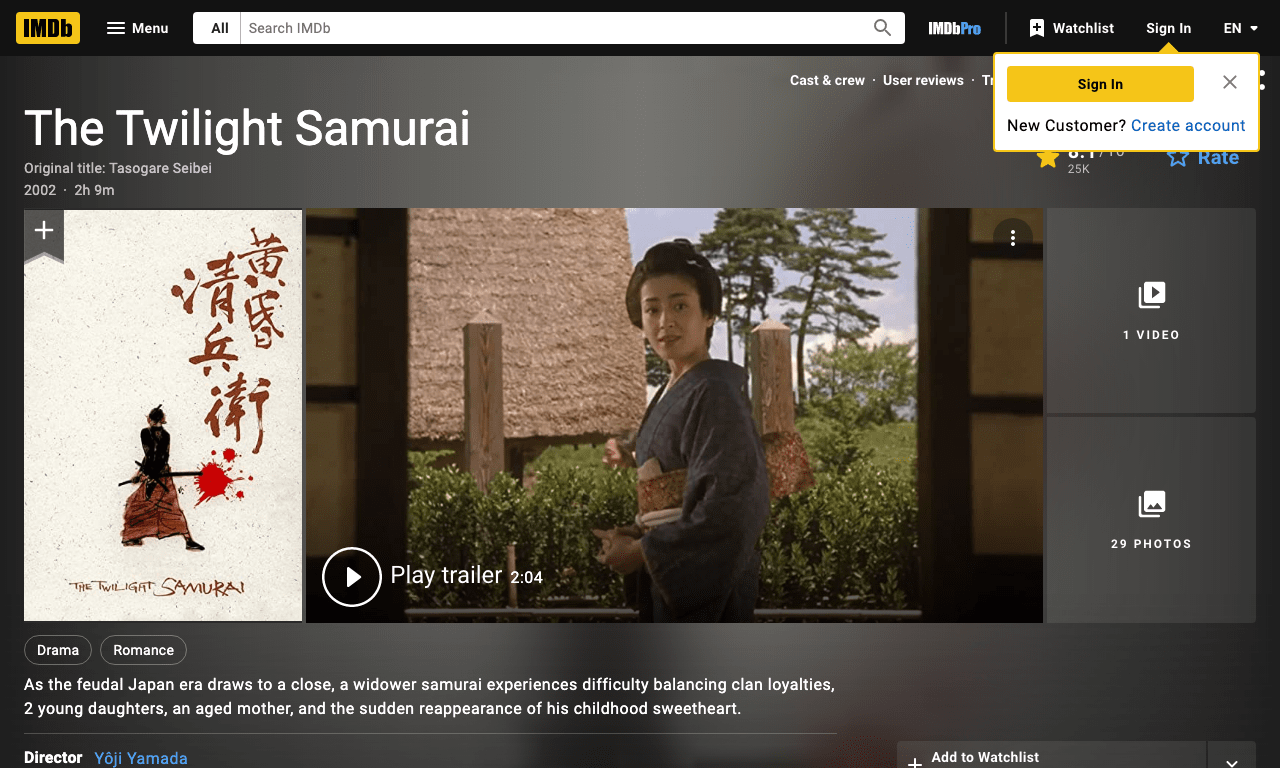
7. The Twilight Samurai
7.7
The Twilight Samurai is a Japanese historical drama film released in 2002. Set in the late 19th century, the movie tells the story of Seibei Iguchi, a low-ranking samurai who struggles to support his daughters and ailing mother. Directed by Yoji Yamada, the film explores themes of duty, honor, love, and sacrifice in a time of social and political change in Japan.
Pros
- The Twilight Samurai features exceptional performances, particularly from Hiroyuki Sanada as Seibei Iguchi. Sanada brings depth and nuance to the character, portraying him as a man torn between his sense of duty and his desire for a simple, peaceful life.
- The film beautifully captures the aesthetics of the samurai era, with stunning cinematography and meticulous attention to detail in the set design, costumes, and props. The visuals transport the audience to a bygone era of Japan, immersing them in the story’s historical context.
Cons
- The pace of The Twilight Samurai is deliberate and slow, which may be off-putting for viewers who prefer more action-packed or fast-paced films. The movie focuses on the inner turmoil and personal struggles of the protagonist, rather than providing thrilling sword fights or intense battle scenes.
- While the film’s exploration of social and political change in Japan is thought-provoking, some viewers may find the historical context and political references challenging to follow. A basic understanding of Japanese history during the samurai era may enhance the viewing experience.
Conclusion: The Twilight Samurai is a poignant and introspective film that offers a unique perspective on the samurai genre. It delves deep into the emotional journey of its protagonist, portraying a character torn between societal expectations and personal desires. While it may not appeal to those seeking thrilling action sequences, the film’s stellar performances and exquisite visuals make it a must-watch for fans of historical dramas and Japanese cinema.
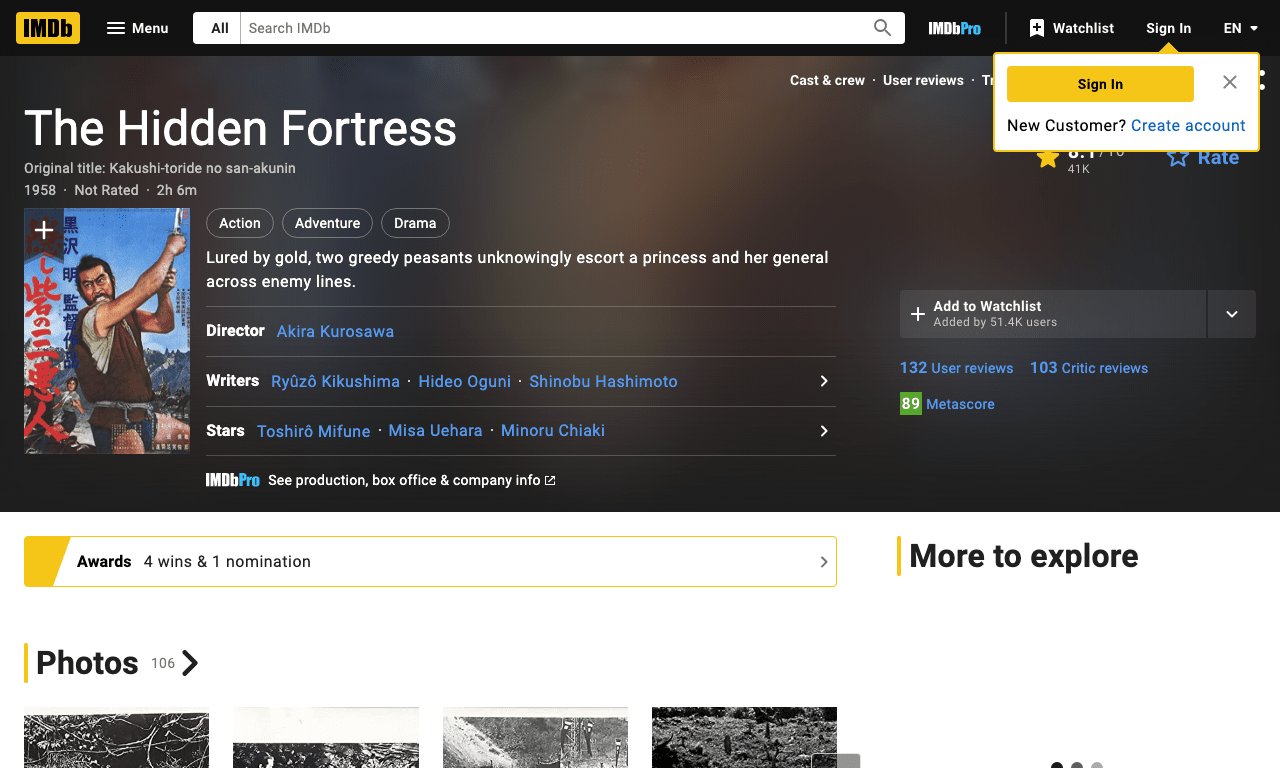
8. The Hidden Fortress
8.0
The Hidden Fortress is a 1958 Japanese epic film directed by Akira Kurosawa. Set in the 16th century feudal Japan, it tells the story of two peasants who get embroiled in a conflict between a general and a princess. They are entrusted with safeguarding the secret location of the hidden fortress, which holds the treasury of the fallen Akizuki clan.
Pros
- The Hidden Fortress offers a unique perspective on the samurai genre, focusing on the journey of two peasants rather than noble warriors. This provides a fresh and engaging narrative.
- The film showcases Akira Kurosawa’s brilliant direction and cinematography. Each shot is meticulously composed and the use of wide-angle lenses and long takes adds depth and visual richness to the storytelling.
Cons
- The pacing of the film may feel slow to some viewers, especially those accustomed to modern, fast-paced movies. However, this deliberate pace allows for character development and exploration of the feudal Japanese society.
- Some viewers may find it difficult to relate to the characters or fully understand the cultural context of the film. The Hidden Fortress is deeply rooted in Japanese history and customs, which may require additional knowledge or research to fully appreciate.
Conclusion: The Hidden Fortress is a visually stunning and thought-provoking film that showcases Akira Kurosawa’s mastery as a director. While it may not be for everyone, particularly those looking for a fast-paced action flick, it offers a unique and immersive cinematic experience that is worth exploring.
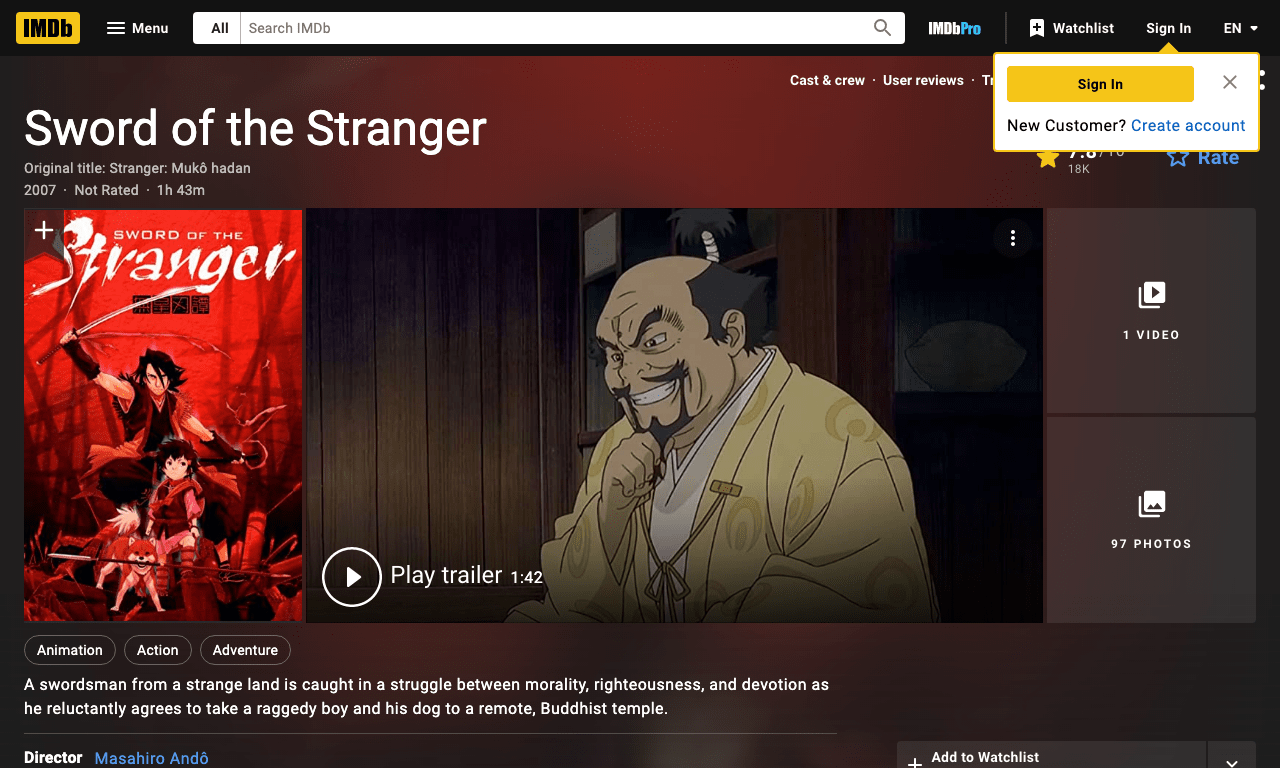
9. Sword of the Stranger
8.2/10
Sword of the Stranger is a captivating animated film set in feudal Japan. The movie follows the story of a nameless swordsman who becomes embroiled in a deadly conflict after he takes in a young boy named Kotaro. As they journey together, they encounter a group of ruthless assassins who are determined to capture Kotaro for mysterious reasons. The film is renowned for its stunning visuals, intense action sequences, and compelling storyline.
Pros
- The animation in Sword of the Stranger is absolutely breathtaking. The fight sequences are fluid, dynamic, and beautifully choreographed. Each frame is a work of art and adds to the overall immersive experience of the film.
- The character development in Sword of the Stranger is top-notch. The nameless swordsman, Kotaro, and other supporting characters are well-written and their motivations are explored in depth. Viewers become emotionally invested in their journeys and root for their triumphs.
Cons
- Some viewers may find the plot of Sword of the Stranger to be somewhat predictable. While the film is executed exceptionally well, it follows certain tropes and conventions of the samurai genre, which can make certain story beats feel familiar.
- The pacing of Sword of the Stranger can be a bit slow at times. While it allows for character development and atmosphere building, some audiences may prefer a faster tempo throughout the film.
Conclusion: Sword of the Stranger is a must-watch for fans of samurai films and animation. Its stunning animation, gripping storyline, and well-developed characters make it a standout film in the genre. Despite its predictable plot and occasional pacing issues, it remains an immensely enjoyable and visually stunning experience.
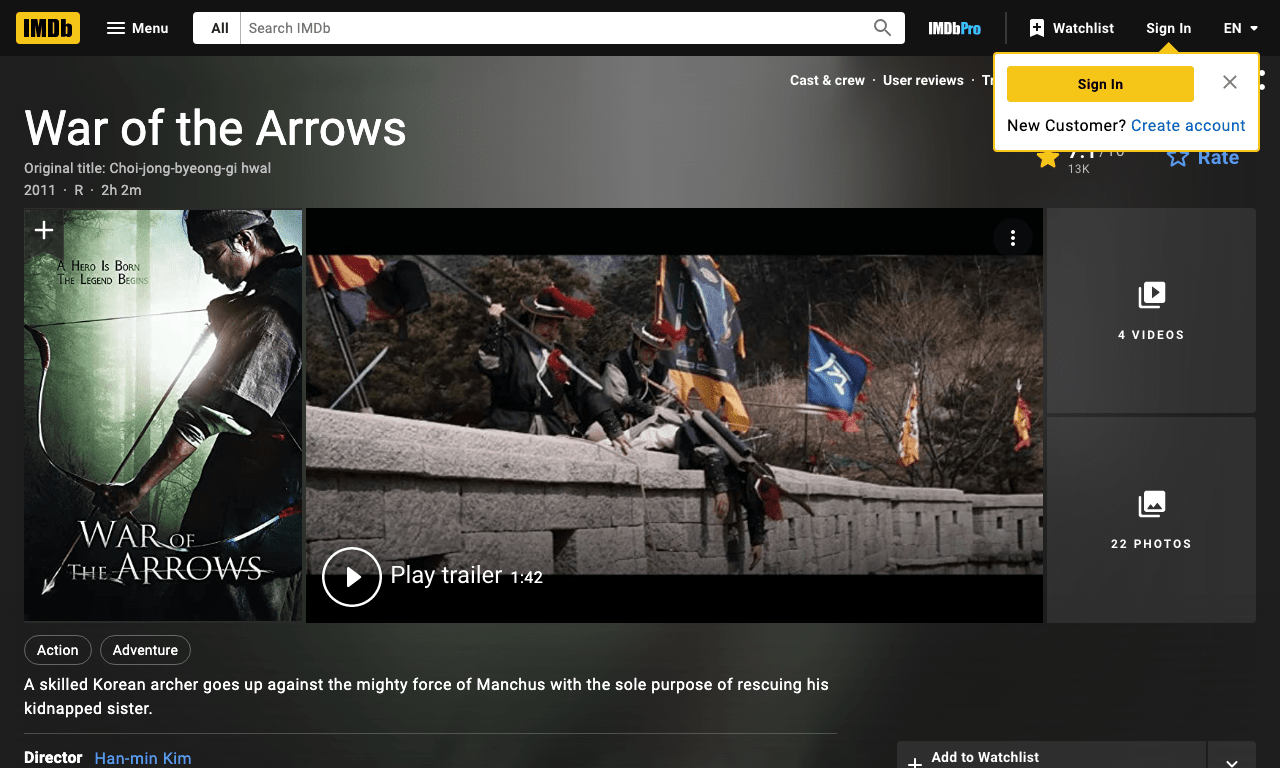
10. Hara-Kiri: Death of a Samurai
7.4
Hara-Kiri: Death of a Samurai is a Japanese period drama film released in 2011. Directed by Takashi Miike, the film is a remake of the 1962 film directed by Masaki Kobayashi. It tells the story of a samurai who seeks to commit ritual suicide before a feudal lord to restore his family’s honor. The film stars Koji Yakusho, who delivers a powerful performance in the lead role. Hailed as a visually stunning and emotionally resonant film, Hara-Kiri: Death of a Samurai explores themes of honor, duty, and the search for meaning in a harsh and unforgiving world.
Pros
- This movie provides a unique and compelling insight into the samurai culture and the code of honor that governed their lives. It offers a glimpse into the intense emotional and psychological struggles faced by those bound by rigid traditions.
- The cinematography is visually stunning, with beautiful and captivating shots that showcase both the grandeur of the samurai era and the brutality of its violence. The attention to detail in the set design and costume further enhances the authenticity of the film.
Cons
- The pacing of the film may be slower compared to other samurai films, which can make it challenging for some viewers to stay engaged throughout the entire movie.
- The film’s somber tone and heavy subject matter may not be suitable for those seeking a more lighthearted or action-packed samurai film experience.
Conclusion: Hara-Kiri: Death of a Samurai is a visually stunning and emotionally impactful film that offers a unique perspective on the samurai culture. Despite its slower pacing, the film is a must-watch for those interested in exploring the depth of honor, duty, and the human condition.
